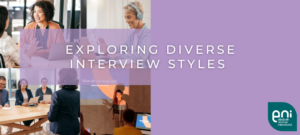Exploring Diverse Interview Styles
…And Finding the Right Fit for Your Hiring Needs.
Over the last few months, ENI have been exploring diverse interview styles and conducting training across different methods, to find best practice (and results) for our clients.
We’ve highlighted some of the most inclusive ways to interview, that ensures candidates not only have the right skills for the role, but also align with your company’s culture and values.
Traditional Structured Interviews
Question style is often related to someone’s CV or work experience. This is possibly the most common method because it allows for a very straightforward evaluation. It’s an easy way to compare candidates on who best meets the job criteria but doesn’t allow much room outside of that.
Competency Interviews
Competency interviews provide a deeper dive into someone’s skill set and are probably our preferred method when interviewing senior candidates. Competencies allow us to focus more on how someone might utilise their skills, and how they approach problems/challenges.
They create a more transparent and objective-led evaluation process, allowing you to understand a candidate’s way of thinking better.
STAR Interviews (Situation, Task, Action, Result)
Sometimes referred to as behavioural interviews, these focus on assessing how candidates have behaved in very specific situations in the past.
They’re a great way of gaining insights into how they might handle future challenges and allows candidates to provide tangible demonstrations of their abilities.
Panel Interviews
This should involve multiple people from different departments – but only if they will have some cross over with the person you’re hiring. Often companies can make the mistake of including a randomly selected panel. It’s proven that this can increase the likelihood of unconscious bias, so we recommend only including those that will work directly, or in some way with this person.
This is mostly used to save time – when there’s an urgent need to hire, or you don’t want to miss out on top talent because you’re busy balancing multiple people’s calendars, a panel interview saves time for everyone, AND allows for a comprehensive evaluation of a candidate’s ability and values.
Case Interviews
A common and effective method when interviewing for analytical roles, to have them analyse, discuss, and solve issues.
This tends to highlight more creative and innovative ways of thinking, giving you a glimpse of their approach when presented with unfamiliar challenges.
Unstructured Interviews
These are more conversational and are used to get to know the candidate while asses their personality and communication skills.
Building a personal connection is really important. With this method, you can adapt the conversation based on their responses, meaning you can explore areas of interest or what makes someone tick, more deeply.
Trial Periods
Some companies are ditching the interview altogether and getting people to come in for a trial. Some people aren’t naturally good at interviews, they may be neurodiverse or may even struggle with nerves – but it doesn’t mean they can’t do the job.
This method allows them to show you. They’re more likely to perform at a high standard with the interview element and pressures removed.
Choosing the right interview style to obtain the information you need and want can be game changing in the long run. If you’re unsure as to what might work best for your business, we can help you to assess this and give advice and guidance based on your needs.
Get in touch: hello@elizabethnorman.com for more information on how we can support you, or if you’d like a copy of our Scorecard template and Guide on how and when to utilise these.
Click here to head back to our resources section and follow us on LinkedIn to keep up with the latest jobs, trends and insights in the industry.

